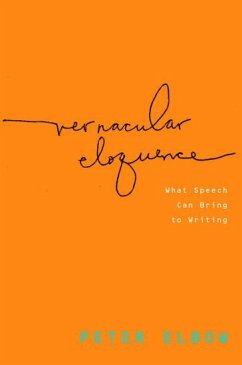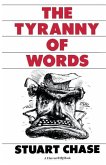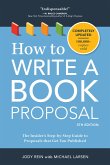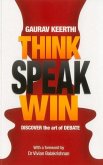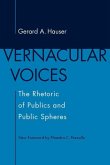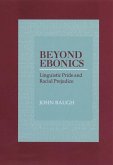21,99 €
inkl. MwSt.
Versandfertig in über 4 Wochen

11 °P sammeln
- Broschiertes Buch
- Merkliste
- Auf die Merkliste
- Bewerten Bewerten
- Teilen
- Produkt teilen
- Produkterinnerung
- Produkterinnerung
A writing guide for the twenty-first century, Vernacular Eloquence explores how the variety of ways the spoken word can enhance the written word, drawing on examples from blogs, email, and other recent trends.
Andere Kunden interessierten sich auch für
![Tyranny of Words Tyranny of Words]() Stuart ChaseTyranny of Words19,99 €
Stuart ChaseTyranny of Words19,99 €![How to Write a Book Proposal How to Write a Book Proposal]() Jody ReinHow to Write a Book Proposal18,99 €
Jody ReinHow to Write a Book Proposal18,99 €![Full Voice Full Voice]() Barbara McafeeFull Voice17,99 €
Barbara McafeeFull Voice17,99 €![Think, Speak, Win: Discover the Art of Debate Think, Speak, Win: Discover the Art of Debate]() Gaurav KeerthiThink, Speak, Win: Discover the Art of Debate15,99 €
Gaurav KeerthiThink, Speak, Win: Discover the Art of Debate15,99 €![The Elements of Eloquence The Elements of Eloquence]() Mark ForsythThe Elements of Eloquence18,99 €
Mark ForsythThe Elements of Eloquence18,99 €![Vernacular Voices Vernacular Voices]() Gerard A HauserVernacular Voices40,99 €
Gerard A HauserVernacular Voices40,99 €![Beyond Ebonics Beyond Ebonics]() John BaughBeyond Ebonics72,99 €
John BaughBeyond Ebonics72,99 €-
-
-
A writing guide for the twenty-first century, Vernacular Eloquence explores how the variety of ways the spoken word can enhance the written word, drawing on examples from blogs, email, and other recent trends.
Hinweis: Dieser Artikel kann nur an eine deutsche Lieferadresse ausgeliefert werden.
Hinweis: Dieser Artikel kann nur an eine deutsche Lieferadresse ausgeliefert werden.
Produktdetails
- Produktdetails
- Verlag: Oxford University Press, USA
- Seitenzahl: 456
- Erscheinungstermin: 13. Januar 2012
- Englisch
- Abmessung: 240mm x 159mm x 33mm
- Gewicht: 606g
- ISBN-13: 9780199782512
- ISBN-10: 0199782512
- Artikelnr.: 34156968
- Herstellerkennzeichnung
- Produktsicherheitsverantwortliche/r
- Europaallee 1
- 36244 Bad Hersfeld
- gpsr@libri.de
- Verlag: Oxford University Press, USA
- Seitenzahl: 456
- Erscheinungstermin: 13. Januar 2012
- Englisch
- Abmessung: 240mm x 159mm x 33mm
- Gewicht: 606g
- ISBN-13: 9780199782512
- ISBN-10: 0199782512
- Artikelnr.: 34156968
- Herstellerkennzeichnung
- Produktsicherheitsverantwortliche/r
- Europaallee 1
- 36244 Bad Hersfeld
- gpsr@libri.de
Peter Elbow is Professor of English Emeritus at the University of Massachusetts at Amherst where he also directed the Writing Program from 1996 until 2000. He is the author of Writing Without Teachers (Oxford UP 1973), Writing With Power (Oxford UP 1981), Embracing Contraries (Oxford UP, 1986), Everyone Can Write (Oxford UP, 2000), and Being A Writer (McGraw-Hill, 2002).
* PART ONE. What's Best in Speaking And Writing?
* Introduction: Defining "Speech" and "Writing"
* 1. Speech and Writing as They Are Used: The Role of Culture
* 2. What's Good about Writing
* 3. Speaking as a Process: What Can It Offer Writing?
* 4. Speech as a Product: Eight Virtues in Careless Spoken Language
that Careful Writing Needs
* 5. Intonation: A Virtue for Writing Found at the Root of Everyday
Speech
* 6. Can We Really Have the Best of Both Worlds?
* PART TWO. A Role for the Tongue During the Early Stages of Writing:
Treating Speech as Writing
* Introduction: More Defining
* 7. What is Speaking Onto the Page and How Does Freewriting Teach it?
* 8. Where Else Do We See Unplanned Speaking onto the Page?
* 9. Objections to Speaking onto the Page--And Responses
* 10. The Need for Care: Unplanned Speaking onto the Page is Never
Enough
* PART THREE. A Role for the Tongue During Late Revising: Reading Aloud
and Treating Writing as Speech
* Introduction
* 11. Revising by Reading Aloud. What the Mouth and the Ear Know
* 12. How Does Revising by Reading Aloud Actually Work?
* 13. Punctuation: Living with Two Traditions
* 14. Good Enough Punctuation by Reading Aloud and Listening
* 15. How Speech Can Improve Organization in Writing: Form as Energy
* 16. Summary Chapter: The Benefits of Speaking onto the Page and
Reading Aloud
* PART FOUR. Vernacular Literacy
* Introduction: Dante and Vulgar Eloquence
* 17. Our Present Culture of Proper Literacy and How It Tries To
Exclude Speech
* 18. A New Culture of Vernacular Literacy is on the Horizon
* Appendix I. How Freewriting Went from Dangerous to No Big Deal in the
Composition and Rhetoric Community
* Appendix II. A list of Publications Written in Nonprestige
Nonstandard Versions of English
* Appendix III. A List of Published Works by Peter Elbow
* Introduction: Defining "Speech" and "Writing"
* 1. Speech and Writing as They Are Used: The Role of Culture
* 2. What's Good about Writing
* 3. Speaking as a Process: What Can It Offer Writing?
* 4. Speech as a Product: Eight Virtues in Careless Spoken Language
that Careful Writing Needs
* 5. Intonation: A Virtue for Writing Found at the Root of Everyday
Speech
* 6. Can We Really Have the Best of Both Worlds?
* PART TWO. A Role for the Tongue During the Early Stages of Writing:
Treating Speech as Writing
* Introduction: More Defining
* 7. What is Speaking Onto the Page and How Does Freewriting Teach it?
* 8. Where Else Do We See Unplanned Speaking onto the Page?
* 9. Objections to Speaking onto the Page--And Responses
* 10. The Need for Care: Unplanned Speaking onto the Page is Never
Enough
* PART THREE. A Role for the Tongue During Late Revising: Reading Aloud
and Treating Writing as Speech
* Introduction
* 11. Revising by Reading Aloud. What the Mouth and the Ear Know
* 12. How Does Revising by Reading Aloud Actually Work?
* 13. Punctuation: Living with Two Traditions
* 14. Good Enough Punctuation by Reading Aloud and Listening
* 15. How Speech Can Improve Organization in Writing: Form as Energy
* 16. Summary Chapter: The Benefits of Speaking onto the Page and
Reading Aloud
* PART FOUR. Vernacular Literacy
* Introduction: Dante and Vulgar Eloquence
* 17. Our Present Culture of Proper Literacy and How It Tries To
Exclude Speech
* 18. A New Culture of Vernacular Literacy is on the Horizon
* Appendix I. How Freewriting Went from Dangerous to No Big Deal in the
Composition and Rhetoric Community
* Appendix II. A list of Publications Written in Nonprestige
Nonstandard Versions of English
* Appendix III. A List of Published Works by Peter Elbow
* PART ONE. What's Best in Speaking And Writing?
* Introduction: Defining "Speech" and "Writing"
* 1. Speech and Writing as They Are Used: The Role of Culture
* 2. What's Good about Writing
* 3. Speaking as a Process: What Can It Offer Writing?
* 4. Speech as a Product: Eight Virtues in Careless Spoken Language
that Careful Writing Needs
* 5. Intonation: A Virtue for Writing Found at the Root of Everyday
Speech
* 6. Can We Really Have the Best of Both Worlds?
* PART TWO. A Role for the Tongue During the Early Stages of Writing:
Treating Speech as Writing
* Introduction: More Defining
* 7. What is Speaking Onto the Page and How Does Freewriting Teach it?
* 8. Where Else Do We See Unplanned Speaking onto the Page?
* 9. Objections to Speaking onto the Page--And Responses
* 10. The Need for Care: Unplanned Speaking onto the Page is Never
Enough
* PART THREE. A Role for the Tongue During Late Revising: Reading Aloud
and Treating Writing as Speech
* Introduction
* 11. Revising by Reading Aloud. What the Mouth and the Ear Know
* 12. How Does Revising by Reading Aloud Actually Work?
* 13. Punctuation: Living with Two Traditions
* 14. Good Enough Punctuation by Reading Aloud and Listening
* 15. How Speech Can Improve Organization in Writing: Form as Energy
* 16. Summary Chapter: The Benefits of Speaking onto the Page and
Reading Aloud
* PART FOUR. Vernacular Literacy
* Introduction: Dante and Vulgar Eloquence
* 17. Our Present Culture of Proper Literacy and How It Tries To
Exclude Speech
* 18. A New Culture of Vernacular Literacy is on the Horizon
* Appendix I. How Freewriting Went from Dangerous to No Big Deal in the
Composition and Rhetoric Community
* Appendix II. A list of Publications Written in Nonprestige
Nonstandard Versions of English
* Appendix III. A List of Published Works by Peter Elbow
* Introduction: Defining "Speech" and "Writing"
* 1. Speech and Writing as They Are Used: The Role of Culture
* 2. What's Good about Writing
* 3. Speaking as a Process: What Can It Offer Writing?
* 4. Speech as a Product: Eight Virtues in Careless Spoken Language
that Careful Writing Needs
* 5. Intonation: A Virtue for Writing Found at the Root of Everyday
Speech
* 6. Can We Really Have the Best of Both Worlds?
* PART TWO. A Role for the Tongue During the Early Stages of Writing:
Treating Speech as Writing
* Introduction: More Defining
* 7. What is Speaking Onto the Page and How Does Freewriting Teach it?
* 8. Where Else Do We See Unplanned Speaking onto the Page?
* 9. Objections to Speaking onto the Page--And Responses
* 10. The Need for Care: Unplanned Speaking onto the Page is Never
Enough
* PART THREE. A Role for the Tongue During Late Revising: Reading Aloud
and Treating Writing as Speech
* Introduction
* 11. Revising by Reading Aloud. What the Mouth and the Ear Know
* 12. How Does Revising by Reading Aloud Actually Work?
* 13. Punctuation: Living with Two Traditions
* 14. Good Enough Punctuation by Reading Aloud and Listening
* 15. How Speech Can Improve Organization in Writing: Form as Energy
* 16. Summary Chapter: The Benefits of Speaking onto the Page and
Reading Aloud
* PART FOUR. Vernacular Literacy
* Introduction: Dante and Vulgar Eloquence
* 17. Our Present Culture of Proper Literacy and How It Tries To
Exclude Speech
* 18. A New Culture of Vernacular Literacy is on the Horizon
* Appendix I. How Freewriting Went from Dangerous to No Big Deal in the
Composition and Rhetoric Community
* Appendix II. A list of Publications Written in Nonprestige
Nonstandard Versions of English
* Appendix III. A List of Published Works by Peter Elbow
